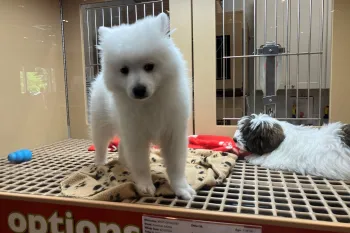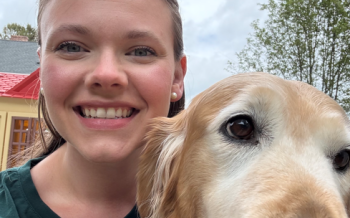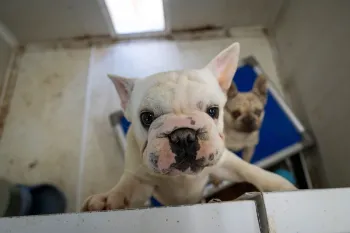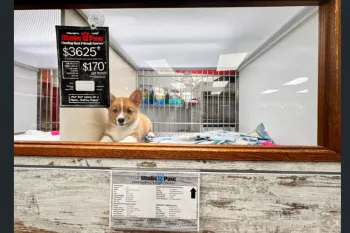This month we are bringing you stories about the fight to stop puppy mills across the United States. Our work in this area is for the sake of the estimated 2.1 million puppies who are sold from roughly 10,000 puppy mills where nearly 500,000 dogs are kept solely for the purpose of breeding. Here, Amanda LoCoco, research program manager for our Stop Puppy Mills campaign, discusses how her work reviewing consumer complaints and breeder inspection reports is all in service of making a more humane world for dogs, such as puppy mill survivor, Gracie.
Gracie startles as I place my coffee mug on the desk. It’s been more than three years since she was rescued from a puppy mill in Pennsylvania, and noises still unsettle her. Gracie was used as a breeder dog at the puppy mill. She is believed to be 9 or 10 years old now and the trauma from living in a puppy mill for most of her life will likely never subside. She is the second puppy mill breeding dog my family has adopted over the years, but sadly the least adjusted to home life.
With Gracie by my side, I log into work. Twelve years into my career with the Stop Puppy Mills campaign as the research program manager, I am responsible for reviewing public complaints, from customers who have purchased puppies, concerned advocates, law enforcement personnel and others. As I read complaints from families who have also been impacted by the cruel puppy mill industry, Gracie’s presence is a constant reminder of the stakes of this work—the dogs who may go their whole lives without knowing the comfort of home and the puppies who may never have a chance to be healthy and happy.
Some complaints reveal stories about sick puppies purchased from breeders or pet stores. Others come from families who, like my own, have decided to rescue former puppy mill breeding dogs. From these messages and from state and federal inspection reports, I have built an extensive internal database for the organization on this industry. Sometimes I joke I can remember the name of a person who ran a puppy mill 10 years ago, but not someone I met 10 minutes ago.
It is not surprising I ended up in this career. My passion for animals started from a very early age and has followed me—or led me, really—throughout my life.
My passion was not always well-informed. I still think about how I helped my friend convince her parents to purchase a pet store puppy. As we brought a Sheltie back to my friend’s house, we could tell something was off immediately. The next day, she was returned due to illness, to an unknown fate.
Back then, I had no idea that puppy mills existed, nor how they were related to pet stores, but the experience planted a seed. My family had always adopted pets from our local shelter, and I have continued to do so with my own family.
My next learning experiences occurred while attending college in Missouri, a known hub for puppy mills. Friends from the state explained the cruel industry to me and I was shocked. I often saw puppies being sold outside Walmart in our college town and one day, on a drive on country roads, friends and I spotted a small breed dog lying in a ditch in the pouring rain. We stopped and took him home with us. He was completely soaked, dirty and matted. No collar, no microchip, no one out looking for him. He found a family with my roommate, but I’ve always wondered how he got to that ditch and why. It’s not unusual for us to hear that puppy mills discard dogs when they are no longer useful, and it would not shock me if this is how he ended up there, tossed away like a piece of trash.
It is real stories like these that help to make our case against puppy mills in the halls of power and in the public eye. Much of our research and outreach work is based on publicly available information, such as inspection reports, but the real stories from real people are a powerhouse for showing the dark truth of this industry. With an estimated 10,000 puppy mills in the U.S., many of which are unregulated and unknown, we may never learn about them without the public alerting us. When families entrust us with their heartbreaking experiences, we can identify patterns and targets for potential action. Many lawsuits, investigations, rescue cases and policy efforts have come out of online complaint forms filled out by concerned individuals across the country.
I will never forget the number of complaints we received in the first few years of my career about an online marketplace that had links to many notorious puppy mills, including many in our Horrible Hundred reports. The sheer volume of complaints led the campaign to discuss the horrible buyer stories with our Animal Protection Law team. Humane World for Animals attorneys worked alongside a local law firm to file a lawsuit alleging the website systematically deleted negative reviews of sellers and created and displayed false, high seller ratings, leading consumers to believe they were seeing listings from reputable breeders. The case eventually settled, resulting in changes to several of the website’s practices and compensating plaintiffs.
Another pattern we identified through the complaints led us to take a closer look at the only national puppy selling pet store chain, Petland. Roughly 1,600 complaints have been filed about Petland stores since our campaign began. To date, Humane World for Animals, formerly known as the Humane Society of the United States, has investigated 10 Petland stores undercover. We have found that Petland stores routinely deceive customers and regularly sell sick puppies, resulting in heartache and high veterinary bills for families. We have also assisted in numerous lawsuits after being contacted by aggrieved families. Complainants have also aided our efforts to pass humane pet store laws and ordinances across the country.
In addition to working with our Animal Protection Law team on identifying targets for litigation, I have the pleasure of working with our investigations department identifying targets for our undercover reports; our Animal Rescue Team coordinating on actionable complaints for law enforcement agencies and providing key research to support a case; our Law Enforcement Outreach and Engagement team on presenting puppy scams trainings to Offices of Attorneys General; and working on key campaign documents, such as our annual Horrible Hundred report.
We base much of our research and outreach work on public information, such as inspection reports, and that allows us to provide facts and education to consumers, advocates, lawmakers and others. But the truth is that we learn a great deal from complaints, and we could not do without them. Each complaint plays a key role in our efforts to stop puppy mills nationwide.
Finishing my coffee, I look over and see Gracie has settled into her dog bed and is now sleeping peacefully (albeit barking at something in her dream). I feel lucky to work each day to change the system that caused suffering in Gracie’s life and so many other animal lives. I hope my team’s work continues to bring awareness to the public and peace to many more puppy mill survivors like Gracie.
If you have a story to tell about a dog you suspect is from a puppy mill, get in touch with us here.
Amanda LoCoco is the research program manager for the Stop Puppy Mills campaign at Humane World for Animals.




